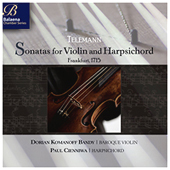
ESSENTIAL RECORDINGS

Sonata no. 1 in G minor, TWV 41:g1
Sonata no. 2 in D major, TWV 41:D1
Sonata no. 3 in B minor, TWV 41:h1
Sonata no. 4 in G major, TWV 41:G1
Sonata no. 5 in A minor, TWV 41:a1
Sonata no. 6 in A major, TWV 41:A1
Sonata in F-sharp minor, TWV 41:fis2 (World Première Recording)
German musician and composer Georg Philipp Telemann (1681-1767) was an exact contemporary of Johann Sebastian Bach (born only 4 years later), held many important posts throughout the country as Kapellmeister and Konzertmeister, and equally as prolific as his counterpart, wrote operas, oratorios, multiple church cantatas, music for ceremonial occasions, orchestral works and an abundance of chamber music, which includes these Sonatas for Violin and Harpsichord from 1715. And yet performances or recordings of his music have always been greatly outnumbered by Bach, and I personally fail to understand the reason why, other than shifting and influential public opinion and tastes. Although to me it feels as if his focus when writing music was, somewhat like Vivaldi, on the instrument's potential and the musician's capabilities, rather than innovation and expansion of the music itself.
This new recording comes to us from an unusual provenance. It is on a small independent label based in Dartmouth Massachusetts, called Whaling City Sound, and this particular release is part of their Balaena Chamber Series of which there seems to be only three so far, since the label's specialty is jazz. But whatever the source this is a welcome release since very few recordings of these intimate works by Telemann are available today. Violinist Dorian Komanoff Bandy lends the proper level of expressive weight to the slow movements and technical élan to the faster movements, and a general sylvan charm to everything as a whole. Harpsichordist Paul Cienniwa's tempos are always impeccably in sync with Bandy's rubato, and the dynamic balance between the two could not be better, with the baroque violin slightly closer. And I'm not sure if there are various editions of these pieces, but I've noticed that Cienniwa's playing is far less ornamented than some which is a good thing, as too many embellishments at the keyboard draw focus away from the violin. And the inclusion of the Sonata in F-sharp minor, unpublished in his lifetime, should entice the diehard Baroque collectors out there to give this recording a listen. The booklet notes specify that "its title page is signed George Melante, Telemann's nearly-anagrammatic pseudonym". Keeping in mind that harmony and tonality were still works in progress at the time, was it possibly discarded because Telemann had started experimenting with different modes and keys, and didn't quite like the F-sharp minor results?
Recorded, mixed and mastered in high-resolution at WGBH Studios in Boston, the audio sits you at just the right distance from the instruments, and projects a tight soundstage.
Jean-Yves Duperron - November 2018